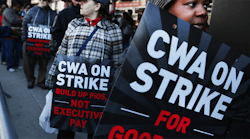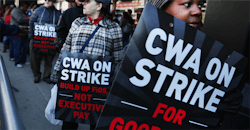About 39,000 landline workers from Verizon Communications Inc.'s largest labor unions walked off the job Wednesday after failing to reach agreement on a new contract with the phone giant by a 6 a.m. deadline. The strike, one of the largest in the U.S. in recent years, may delay billing and technical-support calls as well as disrupt installations for Internet and pay-TV subscribers from Massachusetts to Virginia.
Members of the Communications Workers of America and the International Brotherhood of Electrical Workers, who include cable splicers, customer-service representatives and FiOS technicians, are picketing hundreds of Verizon offices and equipment facilities in the Northeast and Mid-Atlantic, according to the CWA's website.
Embed from Getty Images
In preparation for the strike, Verizon has trained managers and contractors to step into the striking workers' roles, the company said in a statement Tuesday.
"Since last June, we've worked diligently to try and reach agreements that would be good for our employees, good for our customers and make the wireline business more successful now and in the future," Marc Reed, Verizon's chief administrative officer, said in a statement Tuesday.
Verizon had been negotiating with the CWA and the IBEW Workers over terms of a contract to replace one that expired Aug. 1.
The nation's largest wireless carrier wants union workers to contribute more to health benefits and be flexible on temporary job relocations. The unions want to limit those transfers of workers to other regions, protect jobs from being moved offshore and preserve pension increases.
The labor dispute is the first since Verizon took full control of Verizon Wireless and agreed to buy AOL, two deals worth almost $135 billion that point toward a wireless-centric future.
The company has been shedding union-heavy operations, including its FiOS business in three states earlier this month. Last year, landlines accounted for 29% of Verizon's revenue, down from almost 50% in 2008. And as its strategy has shifted, the ranks of union workers have shrunken by about half from 78,000 13 years ago.
Of the workers, about 29,000 are represented by the CWA, 10,000 by the IBEW, according Candice Johnson, a spokeswoman for the CWA.
Shares of Verizon fell 0.2% to $51.87 at 9:36 a.m. Wednesday. The stock had gained 12% this year through Tuesday.
The last Verizon strike was in 2011, after a previous contract expired and talks broke down. The union members returned to work two weeks later. After 15 weeks of negotiations, the sides agreed to new deal.
Phone company strikes haven't been big events for investors. On Aug. 8, 2011, the first day of the last Verizon strike, Verizon shares fell 5.5%. When workers returned on Aug. 20, the stock had fallen less than 1% from its pre-strike level.
During a strike, companies will usually curtail spending on capital improvements and new projects, according to Andrew Hamerling, an independent telecommunications analyst.
"The irony is that these things usually help fiscal results, he said. "Buying any dislocation associated with a strike usually works out well. They have historically proven to be short term blips at worst."
(Photo by Spencer Platt/Getty Images)











